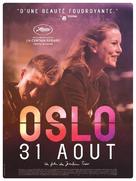Reviews provided by RottenTomatoes
A.O. Scott, New York Times: "Oslo, August 31st" has the satisfying gravity of specific experience, and also, true to its title, a prickly sense of place. Read more
David Edelstein, New York Magazine/Vulture: [It] crosses the blood-brain barrier like ... like ... whatever the drug is, I haven't tried it, thank God. Read more
Jeff Shannon, Seattle Times: With his angular features and intense gaze, Lie is utterly convincing as an intellectual in the process of repairing his damaged life. Read more
Scott Tobias, AV Club: Trier writes his hero into a very tight corner, but finds a simultaneously graceful and uncompromising way out of it. Neat trick, that. Read more
Bill Goodykoontz, Arizona Republic: Te movie seems more like a searing portrait of self-discovery and realization, with the understanding that not everything you learn about yourself will be pleasant. Read more
Ty Burr, Boston Globe: A coolly observed yet boundlessly compassionate day in the life of a recovering drug addict, "Oslo, August 31st" breaks your heart many times over. Read more
J. R. Jones, Chicago Reader: The movie transpires mostly in quiet, engrossing dialogue scenes, and its austere style shares a good deal in common with the protagonist, who seems both opaque and completely exposed. Read more
Lisa Schwarzbaum, Entertainment Weekly: Trier's compassion for what it takes to survive, mixed with the love he bestows on Oslo, is rewardingly profound. Read more
Kenneth Turan, Los Angeles Times: "Oslo" is an example of strong, confident filmmaking in which nothing is miscalculated or out of place. Read more
Veronika Ferdman, L.A. Weekly: With a predilection for long takes, alternating between tripod setups and handheld camera work that's reflective of Anders' unease, Trier presents life as an unceasingly tepid stream of the mundane -- with an occasional, exquisite pinprick of hope. Read more
Rene Rodriguez, Miami Herald: A study of a man who pulled away from the edge of the abyss at the nick of time, only to realize he may not be able to forgive himself for the things he's done. Read more
David Thomson, The New Republic: The beauty is in the array of animated faces in Anders' life. And it's in the simple promise and vitality of Anders' face, which serves the film without any regard for being in a film, let alone a tragedy or a poetic vision of darkness and futility. Read more
Mark Jenkins, NPR: In its depiction of a man who's considering death, the film is never less than fully alive. Read more
Elizabeth Weitzman, New York Daily News: With only two films, Danish director Joachim Trier has soundly established himself as a singular talent. Read more
V.A. Musetto, New York Post: Despite its themes, "Oslo, August 31st" is an exhilarating film, with impeccable direction and pitch-perfect performances that make the bleakness worthwhile. Read more
Tirdad Derakhshani, Philadelphia Inquirer: Pared down and sparse, almost Bressonian in its formal rigor... Read more
Roger Ebert, Chicago Sun-Times: "Oslo, August 31st" is quietly, profoundly, one of the most observant and sympathetic films I've seen. Read more
Andrew O'Hehir, Salon.com: It's a marvelously constructed personal journey, both wrenching and bittersweet, whose emotional ripple effects stay with you for days and weeks afterward. Read more
Mick LaSalle, San Francisco Chronicle: Trier ... keeps us aware of the emotions and perceptions of all the characters, even at those times when their perceptions are limited and differ from objective reality. Read more
Rob Nelson, Minneapolis Star Tribune: [Displays] an invigoratingly acute understanding of the psychology of insecurity, longing, defensiveness and inward-turning rage. Read more
Adam Nayman, Globe and Mail: It has absolute clarity about a character who isn't at all sure about what he wants - or whether he wants to keep going at all. Read more
Linda Barnard, Toronto Star: The result is a superb exploration of loss, guilt and regret in Norwegian director Joachim Trier's often-unpredictable second film. Read more
Dave Calhoun, Time Out: Trier has adapted a 1930s French novel, which in 1963 Louis Malle filmed as 'Le Feu Follet', but this feels totally fresh and modern in its concerns. It's also devastating. Read more
Joshua Rothkopf, Time Out: Moment to moment, you sense the fragility of Anders's fate as it hangs in the balance. Read more
Stanley Kauffmann, The New Republic: [Screenwriters] Trier and Vogt are neat and cunning. Read more
Melissa Anderson, Village Voice: As this elegiac movie reminds us, even a shattered life matters, leaving behind an indelible, intricate imprint. Read more
Ann Hornaday, Washington Post: Trier proves that he's no one-hit wonder. Read more

